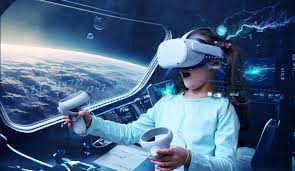In the ever-evolving landscape of entertainment, we find ourselves on a remarkable journey that has transformed the way we perceive and experience the world of entertainment. From the humble beginnings of silent films to the cutting-edge realm of virtual reality, the evolution of entertainment has been nothing short of extraordinary. This article explores the fascinating transformation that has taken place over the decades, highlighting the key milestones that have shaped our entertainment industry.
Silent Films: A Pioneering Era
The era of silent films marked the birth of a captivating visual medium that brought storytelling to life on the silver screen. These early films, devoid of spoken dialogue, relied heavily on powerful visuals, expressive acting, and captivating music to convey their stories. Audiences were transported to different worlds and time periods, all through the magic of silent cinema.
The Lumière Brothers’ Cinematograph
In 1895, the Lumière Brothers unveiled their groundbreaking invention, the Cinematograph. This device allowed for the projection of moving images onto a screen, captivating audiences with short films such as “Arrival of a Train at La Ciotat” and “Workers Leaving the Lumière Factory.” It was a transformative moment that laid the foundation for modern cinema.
The Advent of Silent Film Stars
The silent film era saw the rise of iconic stars like Charlie Chaplin, Mary Pickford, and Rudolph Valentino, who captured the hearts of millions with their charismatic performances. These actors had an unparalleled ability to convey complex emotions without uttering a word, making them household names.
The Transition to Sound: The Jazz Singer
The transition from silent films to talkies was a pivotal moment in the entertainment industry. Al Jolson’s “The Jazz Singer” (1927) was the first feature film to incorporate synchronized dialogue and music, forever changing the way we experience movies. This shift marked the end of the silent film era and ushered in a new age of cinematic storytelling.
The Golden Age of Hollywood
The early 20th century witnessed the emergence of Hollywood as the epicenter of the film industry. This era, often referred to as the “Golden Age of Hollywood,” brought forth a plethora of iconic films and legendary stars, shaping the industry for decades to come.
Epic Films and Genre Pioneers
Hollywood during this period gave birth to epic films like “Gone with the Wind” and “Casablanca,” which continue to be revered as cinematic masterpieces. Genres like film noir, musicals, and westerns found their footing during the Golden Age, contributing to the diverse landscape of entertainment.
The Studio System
The studio system, with major players such as Warner Bros., MGM, and Paramount, wielded significant influence during this time. These studios were known for cultivating talent and creating a pipeline of star actors, directors, and writers.
The Television Revolution
The 1950s marked a pivotal moment with the advent of television. The television revolution brought entertainment directly into the homes of millions, challenging the supremacy of cinema. Families gathered around the TV set to watch their favorite shows and witness historical events in real-time.
Iconic TV Shows
Shows like “I Love Lucy,” “The Twilight Zone,” and “The Ed Sullivan Show” became cultural phenomena, showcasing the power of the small screen in shaping popular culture.
Color Television
The transition from black-and-white to color television further enhanced the viewing experience, making programs more visually appealing and immersive.
The Digital Age: Streaming and Beyond
As we fast forward to the present day, the entertainment industry is experiencing yet another seismic shift. The advent of the internet and digital technologies has given rise to streaming platforms, changing how we consume content. Today, we have an unprecedented array of choices, from on-demand streaming services to interactive virtual reality experiences.
Streaming Services
Streaming giants like Netflix, Amazon Prime, and Disney+ have revolutionized how we access and enjoy content. With vast libraries of movies and original series, viewers can tailor their entertainment choices to suit their preferences.
Virtual Reality Experiences
Virtual reality (VR) has introduced a whole new dimension to entertainment. It allows users to step into immersive worlds and interact with the environment, providing an unparalleled level of engagement. From gaming to virtual travel experiences, VR is redefining entertainment.


